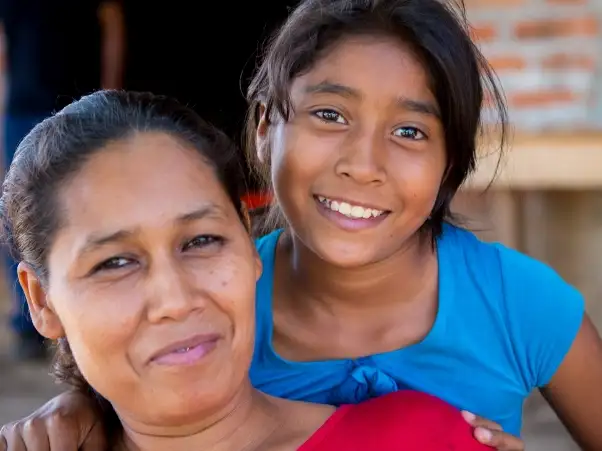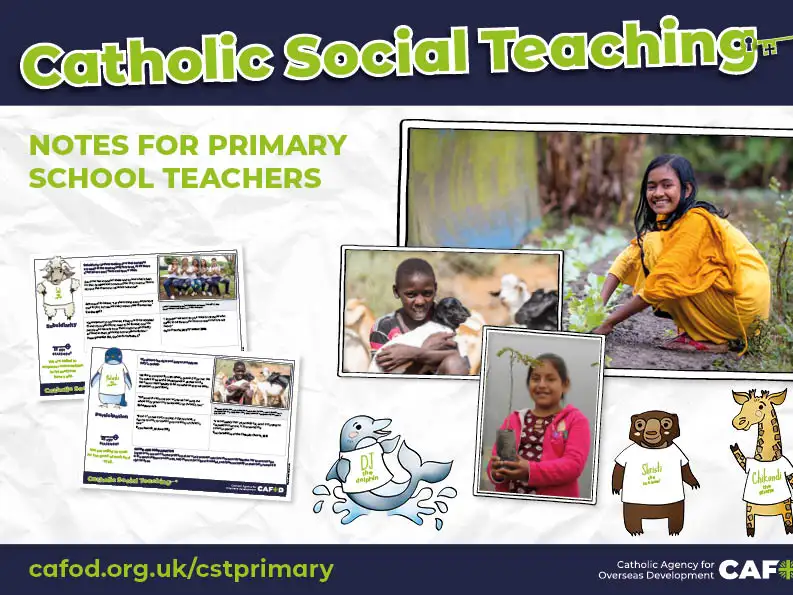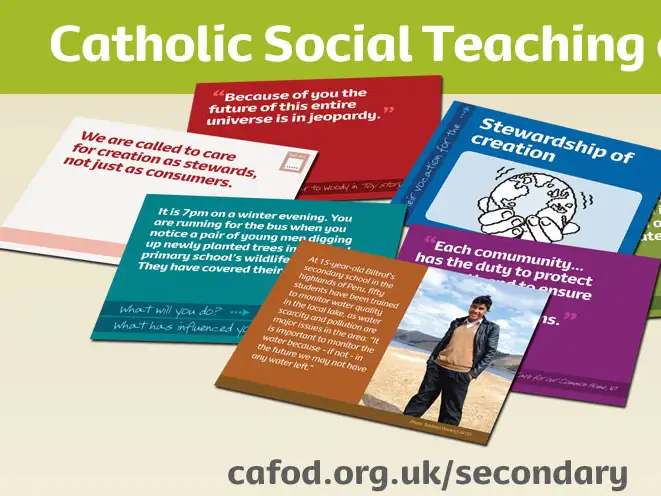Explore our resources for children, including an animation, poster and activities featuring our CST animals.
Catholic social teaching (CST) is rooted in Scripture, formed by the wisdom of Church leaders, and influenced by grassroots movements. It is our moral compass, guiding us on how to live out our faith in the world.
Read more about some of the CST principles which inspire our work.
Our faith calls us to love God and to love our neighbours in every situation, especially our sisters and brothers living in poverty. Following in the footsteps of Christ, we hope to make present in our unjust and broken world, the justice, love and peace of God.
What are the principles of Catholic social teaching?
Modern Catholic social teaching is said to have originated in 1891 with the encyclical letter, Rerum Novarum. Since then, a wealth of teaching continue to give new life to the Scriptures and shape the Church’s response to our modern world. From these Catholic social teaching documents and encyclicals we derive core principles.
Follow our weekly Gospel reflections
Find out more about Laudato Si'
Find out more about Fratelli Tutti
Explore Catholic social teaching resources for children
Explore Catholic social teaching resources for young people
Here are just seven principles which we are inspired by.


Ana Julia and her daughter in El Salvador. Catholic Social Teaching inspires us to see every person as a child of God.
Dignity
We believe every human person is made in the image and likeness of God. This is a gift that we all share as fellow human beings; we are all infinitely loved by our Creator.
God is present in every human person, regardless of religion, culture, nationality, orientation or economic standing. Each one of us is unique and beautiful. We are called to treat every person and every creature with loving respect.
Mulenga lives with undiagnosed mental and physical illnesses in Zambia. He speaks about how his dignity is honoured, thanks to the support of CAFOD and the Sisters of the Sacred Hearts of Jesus and Mary.
“The Sisters gave me some fertiliser and some plants. I had never moved from this place before they gave me the wheelchair. Now, I am able to go to the church with the wheelchair to practice my faith.”
Before I formed you in the womb, I knew you.
Solidarity
Solidarity arises when we remember that we belong to each other. We reflect on this in a special way at Mass. The Catechism of the Catholic Church states, “The Eucharist commits us to the poor. To receive in truth the Body and Blood of Christ given up for us, we must recognise Christ in the poorest.”
Solidarity spurs us to stand side by side with our sisters and brothers, especially those living in poverty. Robert Corry, father-of-two, ran the London marathon last year and raised an amazing £2,000 for CAFOD. He explains how his faith inspires him to act in solidarity:
“It can be difficult to get out of bed early in the morning to fit in the next training session, but then I think about the people CAFOD supports, and I ask myself how I would cope if my house was destroyed or if I lost my family in the war.
“We should help however and whoever we can, and thinking about our global neighbours is what keeps me going to the end.”
In truth I tell you, in so far as you did this to one of the least of these brothers [or sisters] of mine, you did it to me.
The common good
The common good means that the fruits of the earth belong to everyone. No one should be excluded from the gifts of creation. Pope Paul VI spoke about this 50 years ago in his encyclical Populorum Progressio.
Sonia Sanchez is an environmental defender in El Salvador. She has been involved in a project, supported by our partners and the EU, to protect people who face personal threats for their efforts to stand up for human rights.
Sonia says, “Humankind has always put money at the centre of everything. But when we think about our relationship with the natural resources, we see that life should be at the centre of everything. When we reflect on this we realise that we are part of life, we are not the owners and masters of it.”
You are not making a gift of your possessions to the poor person. You are handing over to them what is theirs.
Option for the poor
The option for the poor reminds us of God’s preferential love for the poorest and most vulnerable people. God’s love is universal; he does not side with oppressors, but loves the humble.
This principle is believed to have originated from the Liberation Theology movement in Latin America. For the first time, people living in poverty in the slums were holding the Bible in their own hands and imagining a world free from injustice. This radical thinking shaped CAFOD’s early work in the 1960s.
More recently, some Catholic theologians have spoken about an ‘option for the earth’. Pope Francis writes, “the earth herself, burdened and laid waste, is among the most abandoned and maltreated of our poor” Laudato Si’ #2.
The spirit of the Lord is on me, for he has anointed me to bring the good news to the afflicted. He has sent me… to let the oppressed go free.
Peace
Peace… is an order that is founded in truth, nurtured and animated by charity, and brought into effect under the auspices of freedom.
Peace is a cornerstone of our faith. Christ, the Prince of Peace, sacrificed himself with love on the cross.
In 1963, Pope John XXIII published Pacem in Terris (Peace on earth). It was a dangerous time for humanity; with the rise of nuclear weapons, the frightening stand-off between the US and the Soviet Union over the Cuban Missile Crisis, and the building of the Berlin Wall. The Pope's letter urged the world to seek peace.
Today, our troubled world is still in need of peace. More than 60 years of internal armed conflict has affected millions of people in Colombia. The conflict between the Colombian government and the then-largest guerrilla group, the Revolutionary Armed Forces of Colombia (FARC), officially began in 1964. In 2016, a historic peace accord was signed between the government and FARC. However, conflict endures, now increasingly fragmented and complex.
Thanks to your generosity and prayers, we are supporting partners who are contributing to a culture of peace and the importance of caring for our Common Home. Young people, parents and teachers are learning more about peaceful conflict resolution, how to manage emotions and how to live in harmony with the environment.
Creation and environment
Who turned the wonderworld of the seas into underwater cemeteries bereft of colour and life?
In the first pages of the Bible we read how God created the sun and the stars, the water and earth, and every creature. We believe Christ is the redeemer of all creation.
In 2015, Pope Francis brought together decades of Church teaching in the encyclical, Laudato Si’. In this deeply influential letter, Pope Francis invites everyone on the planet to consider how our actions are affecting the earth and the poorest people. Everything is interconnected, and all of creation praises God. It is our Christian vocation to care for creation.
Trish Sandbach helps to run an allotment in her livesimply parish in Leeds diocese. She says, “livesimply has enabled me to name something in my faith that I have held in my heart for a very long time. The link was made between our care for this patch of earth and how this needed to be much bigger globally.”
The dignity of work and participation
A small number of very rich men have been able to lay upon the teeming masses of the laboring poor a yoke little better than that of slavery itself.
The dignity of work has been a key principle of Catholic social teaching from the very beginning.
In 1891, Pope Leo XIII issued Rerum Novarum (On Capital and Labour). He shone a light on the injustice and exploitation of workers by the rich during the Industrial Revolution. He advocated for workers to join forces and fight against inhuman conditions.
Since then, Church teaching has upheld the dignity of work and participation. The human person should always come before the pursuit of profit. Workers have the right to join trade unions, to a just wage, to spend time with their families and to rest. Work is an essential part of our human dignity and everyone has the right to participate.
At CAFOD we know that earning a living is essential to living with dignity. Anil Roy is a young man living in Bangladesh. He used to be a teacher but when he fell sick, he had to travel to India for treatment and this cost him dearly. With training from our partner Caritas Bangladesh, Anil is now supporting himself through beekeeping. He plans to encourage his neighbours to get involved in similar work. One day, he dreams of having his own big beekeeping farm.
Catholic social teaching resources for schools
Cards, animations and activities to explore Catholic social teaching with young people.


 Download our Laudato Si' study guide
Download our Laudato Si' study guide
